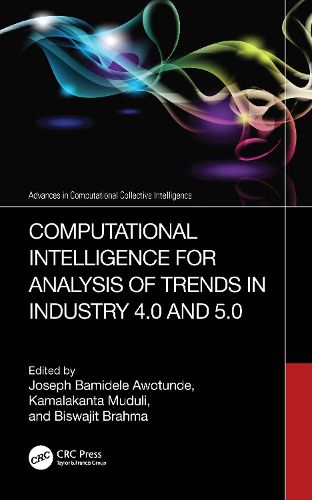Readings Newsletter
Become a Readings Member to make your shopping experience even easier.
Sign in or sign up for free!
You’re not far away from qualifying for FREE standard shipping within Australia
You’ve qualified for FREE standard shipping within Australia
The cart is loading…






Industry 4.0 and 5.0 applications will revolutionize production, enabling smart manufacturing machines to interact with their environments. These machines will become self-aware, self-learning, and capable of real-time data interpretation for self-diagnosis and prevention of production issues. They will also self-calibrate and prioritize tasks to enhance production quality and efficiency.
Computational Intelligence for Analysis of Trends in Industry 4.0 and 5.0 examines the trends in applications that merge three key disciplines: Computational Intelligence (CI), Industry 4.0, and Industry 5.0. It presents solutions using Industrial Internet of Things (IIoT) technologies, augmented by CI-based techniques, modeling, controls, estimations, applications, systems, and future scopes. These applications use data from smart sensors, processed through enhanced CI methods, to make smart automation more effective.
Industry 4.0, integrates data and intelligent automation into manufacturing, using technologies like CI, IoT, IIoT, and Cloud Computing. It transforms data into actionable insights for decision-making and process optimization, essential for modern competitive businesses managing high-speed data integration in production processes. Currently, Industry 4.0 and 5.0 are undergoing significant transformations due to advances in applying AI, big data analytics, telecommunication technologies, and control theory. These trends are increasingly multidisciplinary, integrating mechanical, control, and information technologies. However, they face such technical challenges as parametric uncertainties, external disturbances, sensor noise, and mechanical failures. To address these, this book examines such trends as CI technologies as fuzzy logic, neural networks, and reinforcement learning and their application to modeling, control, and estimation. It also covers recent advancements in IIoT sensors, microcontrollers, and Big Data Analytics that further enhance CI-based solutions in Industry 4.0 and 5.0 systems.
$9.00 standard shipping within Australia
FREE standard shipping within Australia for orders over $100.00
Express & International shipping calculated at checkout
Industry 4.0 and 5.0 applications will revolutionize production, enabling smart manufacturing machines to interact with their environments. These machines will become self-aware, self-learning, and capable of real-time data interpretation for self-diagnosis and prevention of production issues. They will also self-calibrate and prioritize tasks to enhance production quality and efficiency.
Computational Intelligence for Analysis of Trends in Industry 4.0 and 5.0 examines the trends in applications that merge three key disciplines: Computational Intelligence (CI), Industry 4.0, and Industry 5.0. It presents solutions using Industrial Internet of Things (IIoT) technologies, augmented by CI-based techniques, modeling, controls, estimations, applications, systems, and future scopes. These applications use data from smart sensors, processed through enhanced CI methods, to make smart automation more effective.
Industry 4.0, integrates data and intelligent automation into manufacturing, using technologies like CI, IoT, IIoT, and Cloud Computing. It transforms data into actionable insights for decision-making and process optimization, essential for modern competitive businesses managing high-speed data integration in production processes. Currently, Industry 4.0 and 5.0 are undergoing significant transformations due to advances in applying AI, big data analytics, telecommunication technologies, and control theory. These trends are increasingly multidisciplinary, integrating mechanical, control, and information technologies. However, they face such technical challenges as parametric uncertainties, external disturbances, sensor noise, and mechanical failures. To address these, this book examines such trends as CI technologies as fuzzy logic, neural networks, and reinforcement learning and their application to modeling, control, and estimation. It also covers recent advancements in IIoT sensors, microcontrollers, and Big Data Analytics that further enhance CI-based solutions in Industry 4.0 and 5.0 systems.